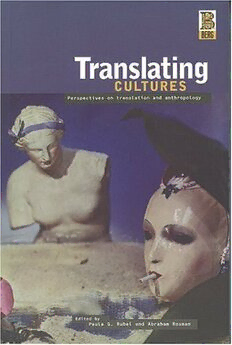
Translating Cultures: Perspectives on Translation and Anthropology PDF
302 Pages·2003·0.884 MB·English
Most books are stored in the elastic cloud where traffic is expensive. For this reason, we have a limit on daily download.
Preview Translating Cultures: Perspectives on Translation and Anthropology
Description:
The task of the anthropologist is to take ideas, concepts and beliefs from one culture and translate them into first another language, and then into the language of anthropology. This process is both fascinating and complex. Not only does it raise questions about the limitations of language, but it also challenges the ability of the anthropologist to communicate culture accurately. In recent years, postmodern theories have tended to call into question the legitimacy of translation altogether. This book acknowledges the problems involved, but shows definitively that 'translating cultures' can successfully be achieved.The way we talk, write, read and interpret are all part of a translation process. Many of us are not aware of translation in our everyday lives, but for those living outside their native culture, surrounded by cultural difference, the ability to translate experiences and thoughts becomes a major issue. Drawing on case studies and theories from a wide range of disciplines -including anthropology, philosophy, linguistics, art history, folk theory, and religious studies - this book systematically interrogates the meaning, complexities and importance of translation in anthropology and answers a wide range of provocative questions, such as:- Can we unravel the true meaning of the Christian doctrine of trinity when there have been so many translations?- What impact do colonial and postcolonial power structures have on our understanding of other cultures?- How can we use art as a means of transgressing the limitations of linguistic translation?Translating Cultures: Perspectives on Translation and Anthropology is the first book fully to address translation in anthropology. It combines textual and ethnographic analysis to produce a benchmark publication that will be of great importance to anthropologists, philosophers, linguists, historians, and cultural theorists alike.
See more
The list of books you might like
Most books are stored in the elastic cloud where traffic is expensive. For this reason, we have a limit on daily download.
